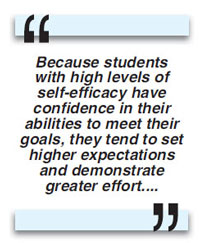 Social cognitivists explore the nurture perspective in the social versus biological learning theory debate. Through the lens of the social cognitivist, nature provides a range of affordances that are optimized by socio-cultural cognition. Albert Bandura is a socio-cognitive theorist who explores the concept of human agency as the deliberate intentions and actions of the learner. Personal, proxy and collective agency are the three key features of Bandura’s theory on human agency.
Social cognitivists explore the nurture perspective in the social versus biological learning theory debate. Through the lens of the social cognitivist, nature provides a range of affordances that are optimized by socio-cultural cognition. Albert Bandura is a socio-cognitive theorist who explores the concept of human agency as the deliberate intentions and actions of the learner. Personal, proxy and collective agency are the three key features of Bandura’s theory on human agency.
 Personal agency is the ability to be generative, creative, proactive, reflective and reactive. It is developed through cognitive processes, social and cultural experiences, purposeful pursuits and self-reflections . When students are given tasks they make deliberate intentions to act mindfully, determine what is expected of them, set personal, motivational goals, construct and test hypotheses, reflectively test their adequacy and evaluate their results.
Personal agency is the ability to be generative, creative, proactive, reflective and reactive. It is developed through cognitive processes, social and cultural experiences, purposeful pursuits and self-reflections . When students are given tasks they make deliberate intentions to act mindfully, determine what is expected of them, set personal, motivational goals, construct and test hypotheses, reflectively test their adequacy and evaluate their results.
 Bandura contends that student actions give rise to a self-reactive influence through comparing their performance with their personal goals and standards. If they experience difficulty, they either engage in self-enabling or self-debilitating self talk . If they believe they can overcome the difficulty they will increase their effort, but if they do not believe they can overcome the difficulty they view the failure as a personal deficiency and will become despondent. If they feel they are undervalued or disrespected they will become apathetic or hostile . These self-regulatory and motivational factors affect the personal agency of the learner.
Bandura contends that student actions give rise to a self-reactive influence through comparing their performance with their personal goals and standards. If they experience difficulty, they either engage in self-enabling or self-debilitating self talk . If they believe they can overcome the difficulty they will increase their effort, but if they do not believe they can overcome the difficulty they view the failure as a personal deficiency and will become despondent. If they feel they are undervalued or disrespected they will become apathetic or hostile . These self-regulatory and motivational factors affect the personal agency of the learner.
 Self-efficacy is an important element in the success of the learner. Bandura believes there is a distinct link between learning and the belief of the student in their ability to achieve tasks in order to learn. His research into the social and cultural process of learning found that students who were capable of learning often failed to achieve because they lacked confidence in their ability to achieve a task. He described this self-belief in an ability to perform a task as self-efficacy. The level of student self-efficacy can be improved by teacher or peers modelling a task, observing other similar students successfully achieving a task, which Bandura terms ‘vicarious learning’ or watching videos of their own successful performance .
Self-efficacy is an important element in the success of the learner. Bandura believes there is a distinct link between learning and the belief of the student in their ability to achieve tasks in order to learn. His research into the social and cultural process of learning found that students who were capable of learning often failed to achieve because they lacked confidence in their ability to achieve a task. He described this self-belief in an ability to perform a task as self-efficacy. The level of student self-efficacy can be improved by teacher or peers modelling a task, observing other similar students successfully achieving a task, which Bandura terms ‘vicarious learning’ or watching videos of their own successful performance .
Proxy agency is the deferral to the knowledge or competence of experts to assist with the burden of responsibility. This could be asking for assistance and expert knowledge from a teacher, parent or peer. Proxy agency is helpful but at the same time it makes the learner vulnerable because their success relies on the competence, power or favours of others, which affects the proxy efficacy.
Collective agency is shared deliberate intention to achieve a task using the collective knowledge, skills and abilities. The degree of collective efficacy is affected by the dynamics of the interactions, the coordinated transactions of the group and the shared belief in their collective power to produce results. Bandura believes the stronger the perceived self-efficacy, proxy efficacy and collective efficacy, the higher the aspirations, motivations, staying power and moral resilience of the learners. He states that the visible benefits of a high sense of efficacy are evidenced in a social, cooperative, helpful, sharing learner who has a vested interest in the welfare of others.
Practical Classroom Implications of Bandura’s Theory
Bandura believes that motivational and self-regulatory factors govern the degree of personal engagement and efficacy of the learner. The implications of this in the classroom are that the infrastructure for learning needs to be constructed to ensure that careful planning and implementation strategies are used to maximize motivation and engagement of the learner. The atmosphere of the classroom needs to be warm, encouraging and positive. Learners need to be engaged in social learning opportunities as cognition is social and the most powerful learning is collective rather than individual. Teachers should model acceptance and value of a myriad ways of thinking, speaking and collaborating.
Teachers need to provide challenging and engaging learning tasks that require a need to actively cooperate to achieve a common goal, that push the learners beyond what they know but remain in Vygotsky’s zone of proximal development, within the bounds of what is knowable.
Intervention should be timely, supportive and make use of Socrative questioning to guide learners in their thought processes with encouraging feedback. There should be multiple opportunities to share knowledge, promote proxy agency, engage in collective agency, observe others experiencing success and model learning.
Opportunities should be provided that allow the learners to choose their own learning styles and present their learning in a variety of formats This will encourage learners to develop representational knowledge to enable them to make sense of their world and communicational knowledge where they can pass that knowledge on to others through language, gestures and visualisation
Assessment of learning should provide positive feedback, opportunities to reflect and modify the task based on feedback; furthermore it should encompass alternative ways of conceiving intelligence and diverse ideas to demonstrate learning visualisation.
Are you on the Bandura Bus?
References
Bandura, A. (2001). Social cognitive theory: An agentic perspective. Annual review of psychology, 52(1), 1-26.
Gardner, H., & Hatch, T. (1989). Educational implications of the theory of multiple intelligences. Educational researcher, 18(8), 4-10.
Kalantzis, M., & Cope, B. (2012). New learning: Elements of a science of education. Cambridge University Press.
Roblyer, M., and Doering, A. (2013) Integrating Educational Technology into Teaching: International Edition, 6th Edition, Pearson.
